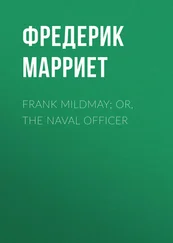Фредерик Марриет - The Mission
Здесь есть возможность читать онлайн «Фредерик Марриет - The Mission» — ознакомительный отрывок электронной книги совершенно бесплатно, а после прочтения отрывка купить полную версию. В некоторых случаях можно слушать аудио, скачать через торрент в формате fb2 и присутствует краткое содержание. Жанр: Детские приключения, literature_19, foreign_antique, foreign_prose, foreign_children, на английском языке. Описание произведения, (предисловие) а так же отзывы посетителей доступны на портале библиотеки ЛибКат.
- Название:The Mission
- Автор:
- Жанр:
- Год:неизвестен
- ISBN:нет данных
- Рейтинг книги:5 / 5. Голосов: 1
-
Избранное:Добавить в избранное
- Отзывы:
-
Ваша оценка:
- 100
- 1
- 2
- 3
- 4
- 5
The Mission: краткое содержание, описание и аннотация
Предлагаем к чтению аннотацию, описание, краткое содержание или предисловие (зависит от того, что написал сам автор книги «The Mission»). Если вы не нашли необходимую информацию о книге — напишите в комментариях, мы постараемся отыскать её.
The Mission — читать онлайн ознакомительный отрывок
Ниже представлен текст книги, разбитый по страницам. Система сохранения места последней прочитанной страницы, позволяет с удобством читать онлайн бесплатно книгу «The Mission», без необходимости каждый раз заново искать на чём Вы остановились. Поставьте закладку, и сможете в любой момент перейти на страницу, на которой закончили чтение.
Интервал:
Закладка:
"How long can a sea-bird remain at sea?"
"I should think not very long, although it has been supposed otherwise; but we do not know so much of the habits of these birds as of others."
"Can they remain long under water?"
"The greater portion of them can not; ducks and that class, for instance. Divers can remain some time; but the birds that remain the longest under water are the semi-aquatic, whose feet are only half-webbed. I have watched the common English water-hen for many minutes walking along at the bottom of a stream, apparently as much in its element as if on shore, pecking and feeding as it walked."
"You say that aquatic birds can not remain long at sea,—where do they go to?"
"They resort to the uninhabited islands over the globe, rocks that always remain above water, and the unfrequented shores of Africa and elsewhere; there they congregate to breed and bring up their young. I have seen twenty or thirty acres of land completely covered with these birds or their nests, wedged together as close as they could sit. Every year they resort to the same spot, which has probably been their domicile for centuries,—I might say since the creation. They make no nests, but merely scrape so as to form a shallow hole to deposit their eggs. The consequence of their always resorting to the same spot is that, from the voidings of the birds and the remains of fish brought to feed the young, a deposit is made over the whole surface, a fraction of an inch every year, which by degrees increases until it is sometimes twenty or thirty feet deep, if not more, and the lower portion becomes almost as hard as rock. The deposit is termed guano, and has, from time immemorial, been used by the Peruvians and Chilians as manure for the land; it is very powerful, as it contains most of the essential salts, such as ammonia, phosphates, etc., which are required for agriculture. Within these last few years samples have been brought to England, and as the quantities must be inexhaustible, when they are sought for and found, no doubt it may one day become a valuable article of our carrying trade. Here comes Mr. Fairburn; I hope he intends to continue his notices of the Cape settlement."
"They have interested me very much, I must confess; he appears well acquainted with the colony."
"He has had the advantage of a long residence, and during that time an insight into all the public documents: this you may be certain of, that he knows more than he will tell."
As soon as Mr. Fairburn joined them, Alexander requested him to continue his narrative, which he did as follows.
"You must not suppose, Mr. Wilmot, that because the English had now possession of the colony, every thing went right; governors who are appointed to the control of a colony require to be there some time before they can see with their own eyes; they must, from their want of information, fall into the hands of some interested party or another, who will sway their councils. Thus it was at the Cape.
"It is true that much good had already been done by the abolition of slavery and the emancipation of the Hottentot; but this was effected, not by the colonial government, but by the representations of the missionaries and an influential and benevolent party at home. The prejudices against the Hottentots, and particularly the Caffres, still existed, and were imbibed by the colonial authorities. Commandoes, or, as they should be more properly termed, marauding parties, were still sent out, and the Caffre was continually oppressed, and, in defiance of the government orders, little justice could be obtained for the Hottentot, although his situation was somewhat improved.
"I will give one instance to show how the rights of the Hottentots were respected by the Cape authorities in 1810,—previous to the emancipation, it is true, but still at a time when the position of the Hottentots and their sufferings had been strenuously pressed upon the colonial authorities by the government at home.
"When the conduct of the Dutch boors had roused the Caffres and Hottentots to war, there were three brothers by the name of Stuurman, Hottentots, who were the leaders. Peace was at length restored, which was chiefly effected by the exertions of these men, who retired peaceably with their own kraal to Algoa Bay; and the government, being then Dutch, appointed Stuurman as captain of the kraal. This independent horde of Hottentots gave great offense to the Dutch boors,—the more so as the three brothers had been the leaders of the Hottentots in the former insurrection. For seven years they could find no complaint to make against them, until at last two of his Hottentots, who had engaged to serve a boor for a certain time, went back to the kraal at the expiration of the term, against the wish of the boor, who would have detained them; the boor went and demanded them back, but Stuurman refused to give them up; upon which, although justice was clearly on the side of the Hottentots, an armed force was dispatched to the kraal. Stuurman still refused to surrender the men, and the armed men retired, for they knew the courage of the Hottentots, and were afraid to attack them.
"By treachery they gained possession of Stuurman and one of his brothers (the other having been killed hunting the buffalo), and sent them to Cape Town, from whence, against all justice, they were sent as prisoners to Robin Island, where malefactors are confined. They made their escape, and returned to Caffreland. Three years afterward, Stuurman, anxious to see his family, returned to the colony without permission. He was discovered and apprehended, and sent as a convict to New South Wales; for the government was at that time English.
"Such was the fate of the first Hottentot who stood up for the rights of his countrymen, and such was the conduct of the English colonial government; so you will observe, Mr. Wilmot, that although the strides of cruelty and oppression are most rapid, the return to even-handed justice is equally slow. Eventually the gross injustice to this man was acknowledged, for an order from the home government was procured for his liberation and return; but it was too late,—Stuurman had died a convict.
"I have mentioned this circumstance, as it will prepare you for a similar act of injustice to the Caffres. When the colony was in possession of the Dutch there was a space of about thirty thousand square miles between the colonial boundary (that is, the land formerly possessed by the Hottentots) and the Great Fish River. This extent of thirty thousand square miles belonged to the Caffres, and was the site of continual skirmishing and marauding between the Dutch boors and the Caffres.
"In 1811 it was resolved by the colonial government that the Caffres should be driven from this territory, and confined to the other side of the Great Fish River. This was an act of injustice and great hardship, and was proceeded in with extreme cruelty, the Caffres being obliged to leave all their crops, and turned out with great and unnecessary slaughter.
"It may be proper, however, to state the causes which led to this Caffre war with the English. At this time the colonial governor had entered into negotiations with a Caffre chief of the name of Gaika. He was a chief of a portion of the Caffres, but not the principal chief, and although the English treated with him as such, the Caffres would not acknowledge his authority. This is a very frequent error committed in our intercourse with savage nations, who are as pertinacious of their rights as the monarchs of Europe. The error on our part was soon discovered, but the government was too proud to acknowledge it.
"It so happened that the other Caffre chiefs formed a powerful confederacy against Gaika, who, trusting to the support of the English, had treated them with great arrogance. They fought and conquered him, carrying off, as usual, his cattle. As this was a war between the Caffres, and confined to their own land, we certainly had no business to interfere; but the colonial government thought otherwise, and an expedition was prepared.
Читать дальшеИнтервал:
Закладка:
Похожие книги на «The Mission»
Представляем Вашему вниманию похожие книги на «The Mission» списком для выбора. Мы отобрали схожую по названию и смыслу литературу в надежде предоставить читателям больше вариантов отыскать новые, интересные, ещё непрочитанные произведения.
Обсуждение, отзывы о книге «The Mission» и просто собственные мнения читателей. Оставьте ваши комментарии, напишите, что Вы думаете о произведении, его смысле или главных героях. Укажите что конкретно понравилось, а что нет, и почему Вы так считаете.












